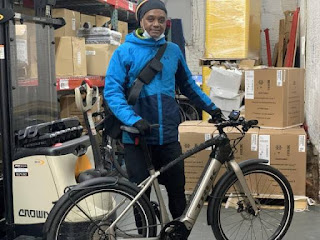 |
| Curtis Phillip, one of New York’s last remaining bike messengers. Photo by Kay Bonrempo. |
In 1983-84 I worked for two small businesses in the same industry. Both are long gone. That, on its face, is not remarkable: Few small businesses, in any industry, last four decades.
I have noticed, however, that none of the other companies that were part of that industry when I was working in it are still in business. In fact, industry itself barely exists and what remains of it is very different.
I am talking about the bicycle courier business. Not so long ago, one would see legions of cyclists, most of them young men, large rectangular bags slung across their bodies. pedaling fixed-gear bikes in slaloms through throngs of buses, taxicabs, vans and pedestrians.
I was one of those couriers, and I saw hundreds of them every day. Now I rarely see even one, even in the Wall Street and Midtown areas of Manhattan.
Apparently, bike messengers like the ones I’ve described are a dying breed, not only in New York, but also in Washington DC and other major cities. Their disappearance has been hastened by the pandemic: Many professionals and businesses still haven’t returned to their traditional downtown office spaces.
But the decline of the bike courier business and bike messenger culture has been unfolding for decades: more or less since I made my last delivery four decades ago. While the world-wide web hadn’t come into existence, there were networks that linked computers within certain geographical areas and industries. And fax machines were already in fairly wide use. Documents that didn’t require physical signatures could therefore be sent remotely.
For a decade or so after I left the business, the number of messengers didn’t seem to decline much, if at all. They were, however, getting less work and their pay—whether by the hour as or per delivery—stagnated or declined. From what I’ve heard and read, messengers today make less in actual—not adjusted—dollars than I made 40 years ago.
Another blow to the world of messengering I knew was, if not a direct result of, then at least accelerated by, the pandemic: food delivery apps. When people used them, they discovered that they could get their sushi brought to them for less than it cost to deliver a sales report. They lost what little reason and inclination they might have had to use a messenger service like the ones for which I worked.
Some bike messengers became “hybrids”: They combined food delivery with ferrying documents and small packages to offices. Those couriers, however, found that delivering food ordered on Door Dash or Grub Hub was taking more of their work day. Some quit because orders placed on apps paid less than their old messenger companies; others didn’t or couldn’t (or didn’t want to) become part of the new wave of delivery workers who ride eBikes or mopeds.
No comments:
Post a Comment